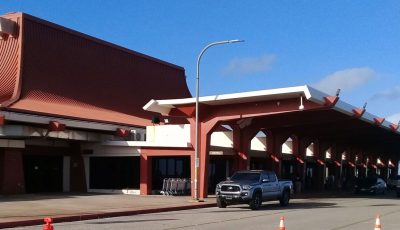IN DISPUTE OVER ASSESSMENT OF USER FEES
CPA: Court has no jurisdiction over Star Marianas’ claim
Saying the claim of breach of contract does not belong to the District Court, the Commonwealth Ports Authority wants dismissed Star Marianas Air Inc.’s lawsuit against CPA over their dispute on user fees.
Star Marianas alleges that CPA breached the Airline Use Agreement or AUA, and Lease of Premises by violating federal laws.
The AUA, which Star Marianas Air executed in April 2009, details the charges and fees that the airline company agreed to pay CPA.
CPA lawyer Robert T. Torres pointed out, though, that the only federal laws Star Marianas cites are the Airport and Airway Improvement Act and the Anti Head Tax Act—and neither of these federal laws confer a private right of action.
Torres said Star Marianas alleges the Airline Deregulation Act confers federal jurisdiction, but the very authority the company cites contains an exception for an airport’s proprietary powers.
“Stripped of these wisps of federal jurisdiction, Star Marianas’ second amended complaint is a plain vanilla breach of contract dispute between the CNMI entities, which does not belong before this court,” the lawyer pointed out.
He added that this dispute is already with the Federal Aviation Administration, which has primary jurisdiction over the matter, and that this is where Star Marianas’ claims should remain.
In its lawsuit originally filed last year, Star Marianas sued CPA and five unnamed co-defendants for breach of contract, violation of the Anti-Head Tax, and for unreasonable user fees.
Star Marianas, through Timothy H. Bellas, wants CPA held liable for damages, court costs, and attorney’s fees.
Star Marianas entered an agreement with CPA, in 2009 to lease and use areas of the commuter terminals on Saipan, Tinian, and Rota. CPA controls and operates the airports in the CNMI.Part of the agreement required Star Marianas to pay a departure facility charge, international arrival facility charge, and in-transit passenger service charge.
In its lawsuit, Bellas argued that the charges calculated on a per-passenger basis violate the AHTA.
Under the AHTA, a state actor “may not levy or collect a tax, fee, head charge, or other charge” on individuals traveling in air commerce.
CPA then moved to dismiss the lawsuit.
Last June, the District Court federal court granted CPA’s motion to dismiss the lawsuit.
U.S. District Court for the NMI designated Judge Frances M. Tydingco-Gatewood ruled that Star Marianas is required to exhaust its administrative remedies and the Anti-Head Tax Act claim must be dismissed.
Tydingco-Gatewood, however, also granted Star Marianas’ request to amend its breach of contract claim.
Following Tydingco-Gatewood’s dismissal order, Star Marianas filed a second amended complaint against CPA claiming breach of contract.
Star Marianas alleges CPA has breached the Airline Use Agreement by charging rates that are in violation of its obligation to charge reasonable rates under the Airport and Airway Improvement Act.
In CPA’s motion to dismiss Star Marianas’ second complaint, Torres said the weight of persuasive authority establishes that the Airport and Airway Improvement Act does not provide for a private right of action.
Torres said the Anti-Head Tax Act also does not provide a right of action.
He said there is no jurisdiction under the federal preemption provision of the Airline Deregulation Act because this statute does not apply to an airport sponsor’s proprietary powers.
Torres added that the Federal Aviation Administration has primary jurisdiction over Star Marianas’ claims.



























